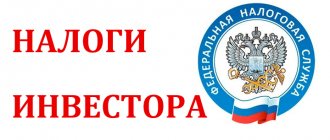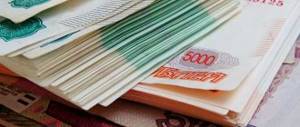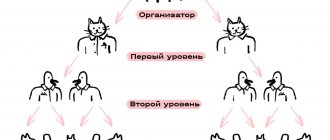Tax on income from transactions with foreign securities
When performing transactions with foreign securities, a positive financial result is subject to taxation - the difference between the purchase price and the sale price of the security. The tax rate in this case is 13% of income received in rubles and 15% for income over 5 million rubles.
How to open a brokerage account
In what currency should you pay tax?
In rubles. The amount of income is converted into rubles at the Central Bank exchange rate on the date of receipt of income minus transaction costs.
Do I need to pay income tax myself?
No no need. The broker will calculate and write off the tax in rubles when you decide to withdraw money from the brokerage account, or close it, or at the beginning of the calendar year following the year of receipt of income. Tax residents of the Russian Federation do not need to declare income from transactions with foreign securities.
How is tax withheld if there is no money in the account?
If you don't have enough money in your brokerage account to withhold the tax, you'll have to pay the tax yourself. You will receive a tax notice and will be required to pay the assessed tax no later than December 1 of the year following the year in which you received the income. You can pay the tax on the website of the Federal Tax Service, State Services, at a bank or at a branch of Russian Post or in another service that shows tax debt.
We talk about the most striking social and labor conflicts
Photo: B1mbo / wikipedia.org
The past year has shown that social and labor conflicts are intensifying in many countries. The reasons were both unpopular steps of governments and ill-considered decisions of employers. The unrest affected most areas of labor activity, but the loudest protests were among transport workers and public sector employees. Repeatedly, industry and international trade unions have united to achieve a common goal, and the number of activists has reached hundreds, thousands and even millions. Solidarity recalls the most significant protests of 2021.
On: protests in the Chilean capital Santiago, November 8, 2021
France
DO NOT TOUCH PENSIONS!
Problem: the introduction of a point-rating system for calculating pensions instead of 42 preferential regimes.
Actions: Throughout 2021, the French General Confederation of Labor (CGT), together with the country's other largest trade unions, held rallies and demonstrations against pension reform. The fight intensified in December when unions called for a nationwide mobilization. It was scheduled for December 5 and 10—actions across the country on these days attracted 1.5 million protesters. Energy workers, air traffic controllers, hospital and school workers, police officers and court employees went on strike. There was almost no public transport, traffic jams in the capital region reached a record 600 kilometers.
Result: despite the protest taken up by all segments of the population, French President Emmanuel Macron declared his “calmness and determination” to reform the pension system. Its final “general architecture” was presented by Prime Minister Edouard Philippe on December 11. The authorities intend to pass the bill through parliament in early 2021.
USA
FOR STABILITY
The problem: General Motors employees demanded higher pay, continued benefits and four-year job security.
Actions: A general strike organized by the United Auto Workers (UAW) at GM plants began on September 16. During the protest, 33 manufacturing plants and 22 distribution warehouses in nine US states stopped operations, and assembly plants in Canada and Mexico were shut down. The number of demonstrators exceeded 49 thousand people. The strike and demands were supported by colleagues from Ford and Fiat Chrysler Automobiles.
Result: The longest and largest protest in the last 50 years at GM plants ended in victory for the UAW on October 26. The union achieved two lump sum payments of 4% of annual wages, retained insurance benefits for staff and insisted on higher wages for all workers. The corporation has pledged to invest $7.7 billion in American auto businesses. However, GM intends to close four plants in the United States, and employment issues have not been fully resolved. General Motors will provide financial assistance to laid-off workers.
Finland
DEFENDED BY THE WHOLE WORLD
Problem: the management of the Finnish postal service was going to cut salaries and transfer some of the employees under the scope of a worse collective agreement.
Protests: For almost a month, members of the postal and logistics union PAU have been demonstrating in the country's largest cities. With flags and banners, workers rallied outside postal service buildings, protesting against wage cuts and the transfer of 700 sorting department employees to another collective agreement with worse conditions, which was signed between the employer and representatives of the “yellow” trade union. More than 10 thousand employees of the Finnish postal service took part in the strikes.
The postal workers were supported by many transport unions, which organized solidarity strikes from November 25 until the end of the campaign. For this reason, Finnair, the largest air carrier in Finland, was forced to cancel more than 300 flights. Public transport drivers, railway workers and sailors joined the strikers. Passengers suffered serious inconvenience. Correspondence was delayed for periods ranging from several days to several weeks.
Result: PAU managed to conclude a new collective agreement with the service sector employers' association, and wages for all postal workers were kept at the same level. In addition, PAU defended the right of employees to independently choose a trade union organization, which left the sorting department under the influence of a favorable collective agreement concluded by PAU. Due to the resolution of the labor conflict, all solidarity strikes planned in the country were cancelled. The icing on the cake of the union's victories was the resignation of the Minister of Local Government and Property Management of Finland, Sirpa Paatero.
USA, countries of Western and Eastern Europe, Asia, Africa
HEALTHIER THE PLANET
Problem: Governments are not taking concrete action to tackle the threat of global warming.
Action: In many countries throughout the year, trade unions, including global groups such as IndustriALL, joined demands for governments to reduce greenhouse gas emissions and slow global warming. Trade unions supported weeks of general mobilization in the spring and autumn of 2021. In September, over 4.5 thousand actions took place in 150 countries as part of the Global Climate Strike. The largest march of environmental activists in history took place in New York three days before the climate summit within the framework of the 73rd UN General Assembly. According to various estimates, more than 200 thousand people took part in the march.
Result: the UN climate summit ended on September 24. Although no new serious promises have been made to reduce greenhouse gas emissions, many countries and companies have announced that they will update plans for the development of renewable energy, make investments in the green economy and UN climate funds.
Great Britain
STILL GOING OUT
Problem: Britain's exit from the European Union threatens the interests of many workers, as a result of which trade unions opposed the corresponding program of the ruling Conservative party and demanded a new referendum on Brexit.
Promotions: trade unions began to oppose the “divorce” of Great Britain and the EU much earlier than 2021, when they realized the possible consequences of Brexit. However, this year was marked by the largest number of protests - on the eve of early elections to the European Parliament, which were supposed to determine the fate of the country. The “rally of the decade” was the October march in London, when half a million Britons demanded a new referendum on Brexit. According to the organizers, the march of protesters stretched for several kilometers.
Result: the Conservative Party of Great Britain won the elections on December 12 with a large margin. Its leader Boris Johnson intends to withdraw the country from the European Union by January 31, 2021.
Portugal
SAVINGS ON STATE EMPLOYEES
Problem: as part of the austerity policy in Portugal, for 10 years the salaries of public sector employees were not increased, social benefits were cut, and benefits were abolished.
Action: the protest of public sector workers was especially powerful in February, but the actions did not stop all year. During the February protests in the country, most government organizations did not work, garbage was not collected, and many medical procedures were canceled in hospitals and clinics. Trade unions demanded higher wages for all workers and a return to the previous level of social benefits. The teachers' strike in October became noticeable. The main requirements were supplemented by the refusal of teachers to work overtime, hold meetings and additional events.
Result: Portuguese Prime Minister António Costa refused to compensate public sector employees for the income lost due to austerity measures. He threatened to dismiss the government if parliament passed the compensation bill. Opposition parties said they will continue to push for compensation, which the government has promised to pay since 2015.
Latvia
MEDICINE BURIED
Problem: the lack of healthcare funding has led to doctors seeking the resignation of the relevant minister and the dissolution of parliament.
Protests: In November, large protests were carried out by Latvian medical workers. They demanded that the government invest 120 million euros in the medical industry and raise workers' wages by 20% starting next year. On November 28, doctors held a rally near the Seimas building in Riga. They insisted on reconsidering the draft state budget for 2021 and called for the current Minister of Health Ilze Vinkele to be removed from office. During the protest, the collection of signatures for the dissolution of parliament began.
Result: Latvian President Egils Levits said that next year's state budget will remain the same. The head of state added that the budget meets the requirements of the European Commission, and also provides for an increase in salaries for doctors, teachers, cultural workers, and court workers. The healthcare industry will receive 60 million euros. Medical trade unions continued collecting signatures for the dissolution of the Seimas. After 12 months, they must submit to the Central Election Commission the signatures of at least 154,865 people (a tenth of voters).
Chile
WHO WILL PAY?
Problem: the formal reason for the protests was an increase in public transport fares in the Chilean capital Santiago. However, the real reason is the social inequality of the population, which has increased in recent years.
Action: mass rallies and demonstrations under the auspices of Chilean trade unions took place in most cities of the country in October-November. They were accompanied by arson, loss of life and a decline in economic activity. The protesters demanded that no laws be passed that would worsen the problem of social inequality in the country.
Result: amid serious unrest, the president declared a state of emergency and curfew in five regions. Due to the unrest, Chilean authorities decided to cancel the APEC summit in November and the UN climate change conference in December.
Ecuador
EXPLOSIVE!
Problem: abolition of government subsidies for diesel and gasoline for the population.
Action: demonstrations began in the country on October 3, after the signing of a decree that abolished state compensation for citizens of the country for their expenses on gasoline and diesel, which is why retail prices for fuel increased by 120%. Drivers of taxis, public transport and freight transport blocked roads in the capital Quito and the major city on the Pacific coast of Guayaquil. The protesters, joined by trade unions, student and indigenous movements, burned tires and threw sticks and bottles at police. The police dispersed the crowd with tear gas. Due to the unrest, a state of emergency was declared in the country. The country's parliament suspended work, and the government and president moved from the unrest-ridden capital Quito to Guayaquil.
Result: under pressure from the protesters, on October 14, the head of state canceled the decree and returned the previous prices for fuel, and the demonstrators promised to stop the actions of disobedience. During the 10 days of protest, seven people died and more than a thousand were injured.
Lebanon
DEFICIT YEAR
Problem: an increase in taxes on fuel, communication services, tobacco and an increase in VAT to 15% by 2022 in order to reduce the state budget deficit.
Action: On October 17, anti-government demonstrations began in Lebanon. Their participants accused the country's authorities of corruption and money laundering at the expense of the population, and demanded the resignation of all officials and a fair trial of them. On October 21, the General Confederation of Lebanese Workers joined the protesters. Government offices, banks, schools, universities and large stores were closed throughout the country. Demonstrators blocked major roads in the capital with barricades made from improvised means. Slogans calling for a change of government were heard on the streets. Police dispersed the demonstrators using tear gas and water cannons. Additional army forces were brought into the capital.
Result: the country's government adopted a program of emergency economic measures to reduce government spending and stop mass protests. Among them: a 50% reduction in salaries for current and former ministers and deputies, the abolition of a number of ministries and state commissions. The program also includes the rejection of new VAT increases in any form, the rejection of taxes on communication services, the abolition of bank secrecy in relation to deputies, ministers and government officials, the privatization of the telecommunications sector and the adoption of a law on the return of funds that were embezzled as a result of corruption, money laundering and the use of other opaque schemes.
Tax on dividends on foreign securities
In addition to income from securities transactions, owners of foreign shares can receive dividends. Tax must be paid on the amount of dividends received.
Tax on dividends is withheld at the rate prescribed by the tax legislation of the country where the issuer is registered. According to Russian tax legislation, dividends are taxed at a rate of 13% and 15% for income over 5 million rubles.
If in the country of the issuer, with which Russia has a Double Taxation Agreement, the tax rate on dividends is higher than the rate provided for by Russian legislation, then the tax is automatically counted towards the payment of Russian personal income tax. If the tax rate in the issuer's country is less than the Russian tax rate, the difference in taxes must be paid in Russia yourself.
To offset in Russia the tax paid in the issuer’s country on dividend income, you need to submit a 3-NDFL declaration and documents confirming the payment of tax abroad to the tax service. The deadline for filing the declaration is April 30 of the year following the year in which the income was received.
Who withholds tax on dividends
The tax is automatically withheld by the foreign issuer of shares or depositary at the time of payment of dividends to the owner of the shares. The broker is not a tax agent for income received in the form of dividends on shares of foreign issuers.
Tax on dividends on US securities
According to US law, the tax rate on dividends of American securities is 30%. In this case, the owner of the shares does not need to independently pay anything extra to the Russian budget, but he must declare the income received by filing a 3-NDFL declaration.
There is a Double Tax Treaty between Russia and the United States, so for Russian tax residents a 10% rate is applied to dividend income. To take advantage of the reduced rate, you must sign Form W-8BEN.
For REITs, the dividend tax rate is not reduced and is 30%.
What is Form W-8BEN
W-8BEN is an Internal Revenue Service (IRS) form that foreign individuals file to verify their country of residence and reduce their income tax rate.
W-8BEN confirms that you are not a US tax resident and pay taxes in Russia. Once this form is signed, dividends on US stock will be taxed at 10%.
Since in Russia dividends are taxed at a rate of 13% and 15% for income over 5 million rubles, you will need to pay an additional 3% or 5%, respectively, and declare the income yourself. To do this, you need to submit a 3-NDFL declaration to the tax service and attach documents confirming the tax withheld at the source of payment at a rate of 10%. The deadline for submitting the declaration and documents is April 30 of the year following the year of receipt of dividends. The tax payment deadline for the submitted return is July 15.
Form W-8BEN applies only to taxes on dividend income from U.S. corporations.
Currently, the Gazprombank Investments application does not accept Form W-8BEN, so dividend tax will be calculated at a rate of 30%. We will add this service in the future.
The Russian stock market began to decline despite market positivity
MOSCOW, May 24 - PRIME, Sergey Astakhov. The Russian stock market on Monday afternoon is declining in terms of the main stock indices after opening in the positive in the morning - despite the positive market external background, the political component continues to act negatively, it follows from trading data.
The Moscow Exchange ruble index by 15.35 Moscow time decreases by 0.18%, to 3653.77 points, the RTS index - by 0.58%, to 1560.48 points.
The dollar exchange rate with “tomorrow” calculations increases at the same time by 15 kopecks, to 73.75 rubles, the euro exchange rate - by 44 kopecks, to 90.06 rubles.
June Brent crude futures are up 1.34% to $67.24 per barrel. European stock indices and index futures in the US are increasing slightly.
The Bank of Russia will strengthen behavioral supervision of financial organizations
VARIABLE DYNAMICS
Thanks to the positive external background at the opening, the Russian stock market showed a short-term upward impulse, but then lost ground due to a moderate drawdown in global stock indices, notes Dmitry Babin from.
On Monday, the Russian stock market shows changeable dynamics in the middle of trading, states Artemy Shamshukov from Finam Group of Companies. In his opinion, favorable factors are the relatively favorable external background, as well as the growth of Brent oil prices. The reason for the latter can be attributed to an incipient storm in the Gulf of Mexico, the analyst clarifies.
But the political agenda is contradictory, Shamshukov continues. “On the one hand, there is a slight decrease in geopolitical tension around the Russian Federation at the moment due to possible negotiations between Putin and Zelensky. On the other hand, the incident with the interception of an airplane in Belarus may have a negative impact on Russian sites,” the analyst argues.
LEADERS OF GROWTH AND FALL
Shares of the Human Stem Cell Institute rise in price by 8.71% on the announcement that the company has submitted documents for clinical trials of a new coronavirus vaccine.
The leaders of growth on Monday were also shares of UWC (+4.95%), Uralsib (+3.33%), Central Telegraph (ordinary securities rise in price by 1.68%, preferred shares - by 3.04%), Mechel (+2.98%), Russneft (+2.34%), Aeroflot (+1.19%), receipts of Globaltrans (+2%), Ozon (+1.58%) and " Tapes (+1.38%), shares of RusHydro (+1.32%),
Prefs of Bank St. Petersburg (−8.4%), WTC (−1.57%), shares of Rosinter (−2.35%), Rosseti (ordinary by 1.13) fell noticeably in price by mid-day %, preferred - by 1.32%), ZIL (−1.1%), Rusala (−1.08%), Petropavlovsk (−1.05%).
FORECASTS
The dynamics of the Russian stock market will be multidirectional, expects John Walsh from Alfa Bank. However, the recovery in oil prices will support shares of the oil and gas sector and bank securities, he predicts.
The nearest resistance for the Moscow Exchange index is at a two-week high of 3,700 points, for the RTS index at Friday’s peak of 1,574 points, Babin assesses the prospects.
Without the resumption of sustainable growth in world markets, Russian stock indices will find it difficult to overcome these technical obstacles, the expert suggests.
Kinds
All foreign bonds, that is, debt securities issued in foreign currency, can be divided into three main groups.
Eurobonds
Eurobonds (Eurobonds) are debt securities that are issued by government and commercial enterprises of foreign countries in foreign currency (usually US dollars).
Such bonds can be sold in any country in the world. Syndicates of financial institutions of a group of states take part in their issue.
Eurobonds of Russian issuers
These are assets of domestic companies issued in foreign currency. Their issue is carried out through an international syndicate of underwriters (legal entities managing the placement of bonds) and is possible only for large banks and corporations.
Bonds of foreign issuers
Such bonds are placed by organizations on the market of another country and are sold in the national currency of that country. Currently, such bonds are not issued in Russia.
Municipal authorities and business entities
Municipal authorities are also issuers.
It is believed that purchasing low-yield bonds from these entities is associated with minimal risk, since the state will not allow a default to be declared in any of its regions, and each municipality has movable or immovable property to secure obligations under the bonds. The concept of issuer rating refers to the creditworthiness of this entity as assessed by an independent rating agency.
Types of issuers
Along with the question “Issuer: what is it?” the types of counterparties making the issue should be considered.
There are three types of structures that have the right to issue:
- state;
- municipal authorities;
- some legal entities.
The state is the largest issuing agent with exclusive rights to print money, which is a means of payment. It has external and internal debt obligations and carries out its issuing activities through the state bank, the treasury and with the help of internal debt obligations. Investors do not consider government securities as a real investment of funds, since a financial crisis may occur that will nullify such investments.
Legal entities that issue securities can be commercial or non-profit organizations. Joint-stock companies issue and sell shares, and banks produce payment cards and traveler's checks for their clients. Securities having the specified material expression are included in the reporting of issuers.
Tearing off the masks
Having a Russian citizen controlled by a foreign company imposes a number of obligations. Firstly, this is a notification to the tax authority in the following order:
1) One-time notification of participation in a foreign company (establishment of a foreign structure without forming a legal entity (ISBOLE)).
A notification of participation in a foreign organization is submitted no later than three months from the date of the formation of a participation interest in such a foreign organization (Clause 3, Article 25.14 of the Tax Code of the Russian Federation).
If this is not done on time, notice may be given at any time. The fine for violating the deadline is relatively small - 50,000 rubles. in relation to each foreign company (structure), charged once (clause 2 of article 129.6 of the Tax Code of the Russian Federation).
2) Annual notification of the presence of controlled foreign companies (CFC), ISBOLE. If a tax resident of the Russian Federation had a CFC (ISBOYUL) in 2021, then the notification is submitted in 2021 - no later than March 20 by the organization and no later than April 30 by the individual. (2 Article 25.14 of the Tax Code of the Russian Federation, paragraph 1.1 of Article 223 of the Tax Code of the Russian Federation, paragraph 12 of paragraph 4 of Article 271 of the Tax Code of the Russian Federation and letter of the Ministry of Finance of Russia dated October 20, 2015 No. 03-03-06/60105). Notifications are submitted in a similar manner for subsequent years.
For failure to provide or submission of a notification containing false information, the fine is already higher - 500,000 rubles (clause 1 of Article 129.6 of the Tax Code of the Russian Federation).
In addition to the notification, the following is submitted:
- financial statements of the CFC for the financial year based on the results of which the resident of the Russian Federation submits a notification (clause 1, clause 5, article 25.15 of the Tax Code of the Russian Federation);
- an audit report on these financial statements of the CFC, if the audit is mandatory in the country of residence of the CFC or is carried out voluntarily (clause 2, clause 5, Article 25.15 of the Tax Code of the Russian Federation).
Documents must be translated into Russian.
Financial statements are submitted by an individual - together with a notification, an organization - along with an income tax return (the deadline for submission of which is no later than March 28).
For failure to provide these documents, the same significant fine is provided as for failure to submit the CFC notification itself - 500,000 rubles (clause 1.1 of Article 126 of the Tax Code of the Russian Federation).
In this case, the tax authority also has the right to request these documents from a resident of the Russian Federation, and the resident of the Russian Federation is obliged to provide them within one month from the date of receipt of the corresponding request (clause 1, clause 2 of Article 25.14-1 of the Tax Code of the Russian Federation). Failure to submit financial statements of a CFC and an audit report even after the request of the tax authority entails the collection of another fine, already in the amount of 1,000,000 rubles (Clause 1.1-1 of Article 126 of the Tax Code of the Russian Federation)
Thus, even if the profit of a CFC is not taxed in Russia, the controlling person must provide the financial statements of the CFC, an auditor’s report on these financial statements and confirm with any documents that the profit of the CFC is exempt from taxation in Russia.
How to avoid the obligation to provide this information:
- Get rid of a controlled foreign company;
- Switch to paying tax on fixed income of CFCs.
Introducing: Fixed Income Tax
From 2021, individuals who have one or more CFCs can relieve themselves of the obligation to disclose the financial statements of their foreign companies, not justify the amount of profit they receive, but pay tax on “fixed profits.” A kind of patent for CFC.
The essence of the mode is as follows:
- Every year, an individual submits only a notification about his CFC (without financial statements, audit report, without any additional documents);
- In this case, it is necessary to pay tax on fixed income. From 2021, the fixed profit is 34 million rubles for all CFCs, i.e. Personal income tax payable on such profit will be ~5 million rubles;
- The taxpayer must apply this regime continuously for at least five years or for at least three years if the taxpayer switches to this regime in 2021.
During the specified five or three years, you can stop applying the taxation regime for fixed profits of CFCs only in situations where the taxpayer has ceased to be a controlling person in relation to all of his CFCs or if the amount of fixed profits is increased by law.
So simple?
Yes and no.
Payment of tax on fixed income of a CFC:
- Does not exempt the controlling person from paying personal income tax upon subsequent distribution of dividends to the CFC;
- This personal income tax is not counted against the subsequent distribution of dividends by the CFC;
- It does not allow taxes paid in the country of registration of the CFC to be offset against personal income tax on CFC dividends.
To make it completely clear, let’s consider the standard procedure for paying taxes on CFC profits.
Issuer: who is it?
An issuer is an organization, object, legal entity that has obligations to investors who own securities, consisting in the implementation of the rights that these documents give.
To understand in more detail what issuers are, it is necessary to take into account that they are various structures: the state, local governments, legal entities.
As a result, a detailed answer to the question of what issuers are will sound like this. These are legal entities that issue securities and ensure the rights enshrined in them. Subject to issue are paper and metal banknotes, shares of joint stock companies, bank cards, traveler's checks, bills, certificates, etc.
Assets that are securities:
- shares (securities that give the shareholder certain rights to receive income from the company’s work);
- bonds and bills (debt securities);
- options (agreements securing the rights of owners to buy/sell an asset in the future);
- depository receipts (certificates securing the right to own a security);
- money;
- debit cards (bank cards in the account of which the bank client’s own funds are stored);
- traveler's checks (requests to receive the amount due at any time).
How to choose and what are the risks
When choosing foreign currency securities, you should evaluate such parameters as:
- profitability;
- depreciation;
- circulation period;
- reliability;
- liquidity;
- features of tax payment;
- accumulated coupon income.
The necessary information about bond issues can be obtained on the Finam and Rusbonds websites.
The main risk when purchasing foreign bonds is currency, which lies in the dynamics of the value of securities. Therefore, before making a transaction, it is necessary to familiarize yourself with the forecasts regarding the quotes of the currency in which it will be made.
Grounds for recognizing a foreign company as controlled
Foreign companies - non-residents of Russia, whose shareholders and/or beneficiaries are residents of the Russian Federation, are considered controlled if:
- the share of participation of a resident of the Russian Federation is more than 25% or the total share in which residents of the Russian Federation is more than 50%, and the share of each of such residents is more than 10%;
- Residents of the Russian Federation, although they do not have a participation share, exercise control over it in their own interests.
The presence of control by a resident of the Russian Federation is determined based on the ability to influence a foreign company’s decision-making on the distribution of after-tax profits not only due to direct and indirect participation in the company, but also on the basis (clause 7 of Article 25.13 of the Tax Code of the Russian Federation):
- participation in the company management agreement;
- other features of the relationship between a resident of the Russian Federation and a foreign company.
For example, when an individual does not directly participate in a foreign company, hiding behind offshore shareholder companies, but is the beneficial owner, the ultimate beneficiary of the foreign company and enters into a trust agreement with the nominee shareholders of the foreign company. In this case, the owner of the business can also be recognized as a controlling person of the foreign company.
A trust in the sense of the Tax Code of the Russian Federation is a foreign structure without the formation of a legal entity (ISBOLE). Such structures are equivalent to controlled foreign companies. (Clause 2 of Article 25.13 of the Tax Code of the Russian Federation)
How to avoid controlled company status:
A) Get rid of the foreign company;
B) Get rid of Russian tax residence.
However. Recognizing a company as controlled is not the same as having to pay taxes on it in Russia!
State as issuer
The state, through the Ministry of Finance, issues federal loan bonds (OFZ) and Eurobonds.
For a conservative investor, an option to hedge against stock market fluctuations may be to purchase such securities, since their yield remains slightly higher than the current inflation rate. If it is impossible to pay (repay) government bonds, the Ministry of Finance declares a default.
By issuing OFZs, the state strives to achieve the following goals:
- increase in the state budget;
- implementation of planned major projects;
- assistance in fulfilling social obligations;
- curbing inflation growth rates.
Another large government counterparty carrying out the issue is the Central Bank. He is free to produce new money (banknotes and coins), that is, to issue them. Thus, a certain currency (money) is put into circulation, which can be used at the discretion of the owner. By introducing additional money supply into circulation, inflation is curbed and prices are maintained at an acceptable level.











